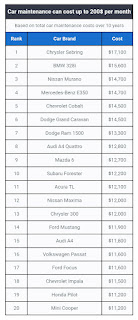 |
| Alexandra Paul |
Many people think having a car at home is a necessity. For the
very much reasons people will often buy more of them as a sign of prestige – because
nothing says “I'm rich a.k.a. better than you are“ more than an extra thing
which you perhaps do not actually need. The earliest people can trace back the
history of cars, as in personal vehicles powered by the internal mechanism, is
back to the 18th century. Seems so early if you compare it with the history of
the human kind itself. Cars have been on this planet for not more than three
centuries. The so-called modern humans, or Homo Sapiens if you
will, have been on this planet for about 200 thousand years. If we look at the
history of human kind as a period of 24 hours, cars made their first appearance
about a half of one minute to midnight. It is quite impressive how
long we had been surviving without cars.
Now that the
point has been made, just to clear it up – this is not an attempt of proving
that cars are useless. It is here just to show how much of an importance is
given to them today and how unimportant they actually are, from the diachronic
point of view of course. What actually is important are vehicles. Vehicles have
helped people explore different continents. Vehicles helped in building
pyramids. Vehicles have been connecting people in so many ways. Cars are
vehicles, but not all vehicles are cars. You
do not need a car. You need a transport or a vehicle. Having a car is not
a dogmatical fact and your feet were made for more than just pressing the
accelerator.
 |
| How much cars do we actually need? |
For an average new car,
people are ready to go into debts by borrowing money or taking loans. By the
time the loan is paid off, the new shiny car lost its value for at least 50%. Moreover,
after, for example, 10 years, regular maintenance might cost up to 200$ per
month. Therefore it is obvious that buying a car out of any other reason than
an actual necessity is pointless and says a lot about our money managment and
personality. A well planned car shopping is definitely a serious thing. Not
only for the individual and his or her family but also for the environment. The
planet has never been more poluted than today and despite the fact that there are
amazing options for buying environment-friendly cars, people ignore it thinking
they might cost them more than the “old-fashion“ automobiles.
 |
| How much cars do we actually need |
So, what can a car say about
their owners. First of all, their reasons for buying a car and how well those
reasons are thought through are obvious. Cars should not be bought because they
are made in our favorite colours or because we want to have more cars than our
neighbours have – because in the end they might cost us more than what we can
afford and we might spend much more money than the amount of money we are trying to prove we have. In any
major town or city, public transport is available. It should be considered how
much a car would cost, including its fuel and maintenance, during several years
and then compared to the price of public transport. Another factor is the fuel
the car goes by. There is a reason so many scientists are working on new kinds
of automobiles which are more environment-friendly than the current ones. Last
but not the least, buying some other type of vehicle might be a better option –
for example a bicycle or motorbike.